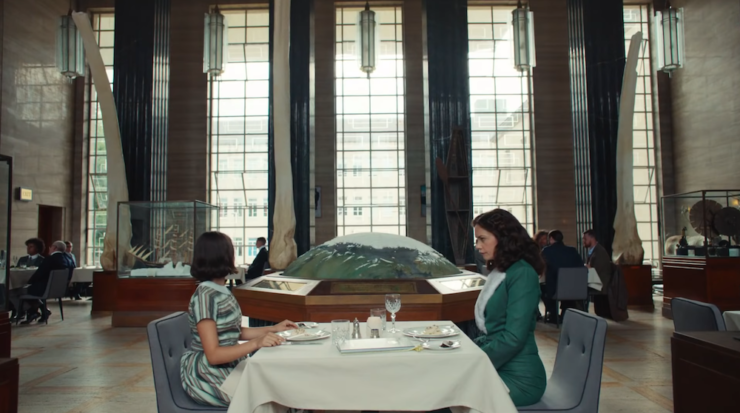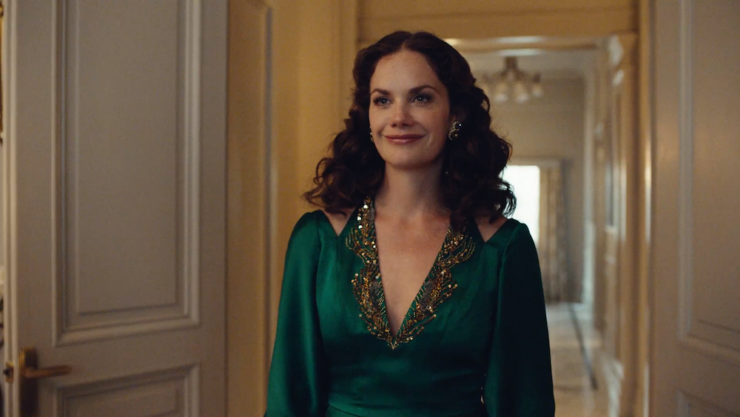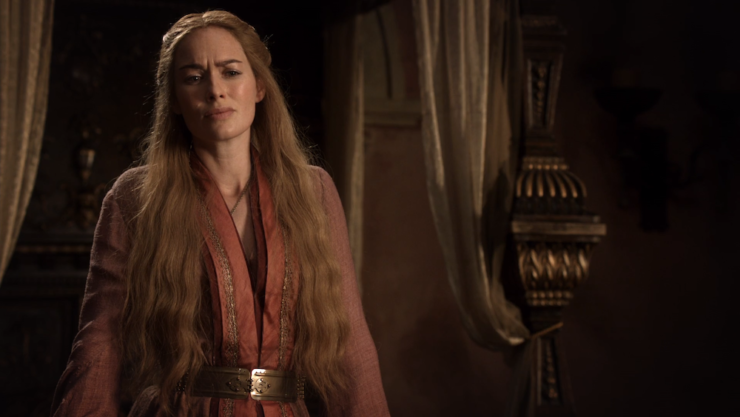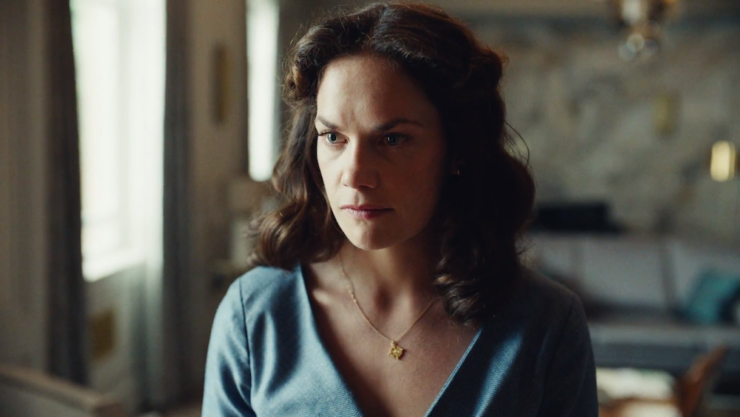One of the great things about superlative children’s literature is its ability to let events unfold from a simplistic, child’s perspective while cluing in older readers to the complexities of an adult world. As an example, look no further than Harry Potter’s Sirius Black, who must seem, to the child reader, the ideal, fun-loving companion to the boy-wizard and, to the adult reader, a troubled man in a state of arrested development who is using Harry to reconnect with his dead school chum.
This balancing act is no easy task. And even the best children’s literature occasionally sacrifices some of the complexity of the adult world in order to keep its narrative centered on a child protagonist’s experience. Such is the case with Phillip Pullman’s His Dark Materials, which is additionally burdened by the fact that much of the world is predicated on heavy theological concepts which Lyra understandably is less interested in than the immediate danger she must face while dealing with agents of the Magisterium and Armored Bears.
And while none of that tension makes HDM a less satisfying read, it is true that one of Pullman’s most intriguing characters is left a little thin and unfairly treated by the narrative. I am speaking, of course, of Mrs Coulter, one of the series’ primary antagonists. I should add here that, in discussing Mrs Coulter in this article two things should be noted: First, I have not done a full reread of HDM in about a decade and while I am attempting to catch up while I watch the show and write these articles, some of my sense of the novels may be based on older information and recollections. Second, any discussion of Mrs Coulter that involves the novels will have to involve MAJOR SPOILERS for the books (and presumably the show), so read on at your own peril.
Worse than Being the Boy Who Lived

A staggering amount of fantasy fiction (not just fantasy fiction that centers on children) has an orphan as its protagonist. From Frodo Baggins—raised by his uncle after the death of his parents—to Harry Potter—defined exclusively by having survived when his parents did not—orphans abound. Pullman’s series begins with a similar supposition: Lyra is presumably an orphan entrusted to the care of the College by her Uncle, Lord Asriel. But as the narrative progresses, we discover that this is all a lie. Lyra is the illegitimate child of Lord Asriel and Mrs Coulter and the fiction about her origins has been maintained for her protection.
I think Pullman seeks to challenge some of the mythic qualities of the orphan-as-hero narrative. What is worse and more abject, Pullman seems to ask, than having lost your parents at a young age? Why, it’s having your parents be selfish and terrible monsters who never particularly cared to have a relationship with you. The most awful revelations in HDM (and there are many) involve Lyra coming to realize that she would have been better off as an orphan. Pullman does, eventually, offer redemption to Asriel and Mrs Coulter in the form of self-sacrifice but it comes with no forgiveness from Lyra. They go to their graves as ostensible saviors of humanity who truly love their daughter…but also as utterly terrible parents.
And all of that makes sense from the childlike perspective of Lyra Belacqua. Mrs Coulter’s change of heart near the climax of Northern Lights is an important plot development and works to save Lyra from the clutches of the Magisterium, but she is given no real moment to bond with her daughter after that. In fact, the majority of the time that Lyra and Mrs Coulter spend together is before Lyra is even aware that Mrs Coulter is her mother, preventing any kind of mother-daughter relationship from developing.
Pullman rarely deviates from Lyra’s point of view in the novels and when, in later books, he eventually brings in outside perspectives, it is rare that he spares a sympathetic word for Mrs Coulter. In fact, in the final novel of the original trilogy, The Amber Spyglass, the Metatron gives an assessment of Mrs Coulter that, though harsh, does not seem all that divorced from Pullman’s own:
Corruption and envy and lust for power. Cruelty and coldness. A vicious probing curiosity. Pure, poisonous, toxic malice. You have never from your earliest years shown a shred of compassion or sympathy or kindness without calculating how it would return to your advantage. You have tortured and killed without regret or hesitation; you have betrayed and intrigued and gloried in your treachery. You are a cess-pit of moral filth.
And, being the author, Pullman is certainly allowed to create a character who is “a cess-pit of moral filth” and whose only redeeming quality is a love for her daughter that is just tepid enough to not allow the child to be killed.
But that character also presents some problems. First of all, insofar as Lord Asriel—not as morally compromised, but a thoroughly disappointing cad—is given the tiniest fraction of credit for not being an entirely absentee father (after all, absentee mothers are conventionally seen as monstrous; absentee fathers are seen as the norm), Pullman treads close to some dangerously sexist tropes relating to the complexities of motherhood. Secondly, without a consistent view of Mrs Coulter we are offered no higher level of complexity than that which Lyra is able to comprehend and process. And it is this adumbration, this vague outline of the broader Mrs Coulter, that we look to HBO/BBC’s adaptation and Ruth Wilson’s performance to refine and deepen.
The Unbearable Weight of Being Mrs Coulter

As I alluded to in my recap earlier this week, Ruth Wilson’s Mrs Coulter is utterly fantastic. We’ll get into the specifics of what makes her performance so mesmerizing in a second, but it is worth mentioning that, in both this series and in the 2007 The Golden Compass film, the camera becomes a freeing device, able to leave the specific point of view of Pullman’s limited third person. In its gaze, Mrs Coulter not only can but must become a more fully fledged character worthy of our discussion and understanding.
But, fascinatingly, in the first two episodes of the current series, very little of what we see of Mrs Coulter outside of Lyra can be seen as a departure, thus far. Instead we get more moustache-twirling with Father MacPhail and Lord Boreal, as well as some sinister faux-friendliness with the kidnapped children. Instead, the majority of the work done to complicate Mrs Coulter is accomplished through Ruth Wilson’s micro-expressions and fleeting bursts of emotion that flash almost subliminally between her icy stares and plastered smiles.
Ruth Wilson’s face is made for awkward smiles. In her work on Luther, she put them to great effect as sociopath Alice Morgan, letting unfiltered joy burst forth in an inappropriate moment or freezing a coy pout in place, trying her best to look slightly more well adjusted than her character was truly capable of. As Mrs Coulter, that smile serves a different purpose. Wilson plays imperfect coquettishness in her awkward smiles as a way of representing simultaneous acquiescence to the patriarchal Magisterium and deep resentment at having to do so. She is just unctuous and accommodating enough to make the audience believe that Boreal and MacPhail underestimate her while giving the viewer a window into a spiteful, painful inner turmoil.
Where the Mrs Coulter of the books was presented as the perfect adept of the Magisterium, collected and disinterested in her cruelty, Wilson’s version of the same clearly chafes at the oversight she is force to accept. In “The Idea of North” she tries to give Lyra some important lessons in the need to suppress her emotions in favor of control. At the explorers’ club she tells Lyra:
Lyra, look around this room. How many women do you see? In every room, there are those that would belittle you. With my help, they won’t lay a scratch on you. […] I can teach you to wield power over all of them, but you must let me mould you.
Mrs Coulter’s hard edges are the direct result of a patriarchal culture with its foot placed firmly atop her throat. Her advice to Lyra is to become like her: a combination of icy and flirtatious—incapable of showing weakness and willing to pretend at being an object of male desire. The end goal, as she explains in the monologue above, is tragically small in scope. Mrs Coulter expresses no desire to use her power to change or topple the system crushing her, merely to be in rooms where women aren’t allowed and to have enough clout to crush the ones who belittle her for being there.
Later, we see a number of domestic scenes which are laced with a kind of tenderness: a private dinner in her flat, a scene of Lyra being bathed by her benefactor, a dress-fitting for a soiree that Mrs Coulter plans to hold. In each of these, though we do not yet know of their familial relationship as an audience, we see Mrs Coulter’s need to guide her estranged daughter into what she sees as a worthy life. These scenes are all underscored by moments where Wilson drops her awkward smile in favor of a thousand-yard stare that looks simultaneously hollow and deeply pained. Playing a woman who cannot afford to lose control, these are critical moments in Wilson’s performance, giving her character a semblance of humanity.
When Mrs Coulter turns to cruelty towards the end of the episode, it is in response to Lyra pointing out her capacity to be human. Just before Mrs Coulter sends her daemon to throttle Pantalaimon, they have the following exchange:
Mrs Coulter: I’m sorry if I was short with you in front of them.
Lyra: You lost control.
C: No, I wouldn’t say I lost control.
L: You were angry, I could see it.
C: No, I wasn’t angry.
It is only when she is belittled by her own (secret) daughter for being unable to measure up to the impossible, sexist standard she has set for herself that we get a window into her sublimated anger. Later in the same scene, after accidentally revealing her loathing for Lord Asriel, pointing out his inability to keep anyone safe (which is, perhaps, in reference to his inability to shield her from rebuke after their affair) she gives Lyra a piece of advice that may as well be a personal mantra: “Our origins don’t define us. It’s what we do with what we have.” The advice sounds pat and certainly falls on deaf ears, but it is, again, not truly aimed just at Lyra. It is the repeated hope of a woman who has sacrificed everything to become part of a system that reviles her.
The series also chooses to reinterpret a telling, powerful moment from the 2007 film which does not feature in the novel. The film, as I and probably countless others have said, is a grand mess of movie and generally not worth one’s time. This moment has stuck with me, though, in part because it was the one time over the course of my viewing that I found myself deeply emotionally affected as well as surprised. It left such an impression that I’ve remembered it for twelve years without a rewatch. In this scene, Mrs Coulter (played by the late-‘90s/early 2000s queen of icy control, Nicole Kidman) sits in an airship, looking at a picture of Lyra in a locket. Her daemon-familiar attempts to close it, as though to say “we need to concentrate on other things” and she slaps the manifestation of her soul to the ground. It looks dejected and they embrace, broken, alienated, and desperate for the previously inviolate comfort of one another.
The series is more subtle in its homage to this scene: Mrs Coulter discovers that Lyra has been attempting to sneak into her office. Lyra thought she saw the golden monkey daemon in there and asks her mother how she can stand to be so far apart from him. Mrs Coulter lies and tells her that she must have been mistaken, that her daemon has been with her the whole time. Lyra is sent back to bed and as soon as she is out of sight, Mrs Coulter slaps the creature in rebuke for being spotted. There is no embrace afterwards.
Seeing as one’s daemon familiar is a piece of one’s soul and all interactions between human and daemon are sacred and intimate, this scene plays out as nod to Mrs Coulter’s deeply distressed inner psyche. Where other daemons act as conscience and empathy, Mrs Coulter’s uniquely silent, uniquely unnamed daemon (though in the BBC radio play it is called “Ozymandias” and in the prequel Book of Dust novels it is jokingly referred to as “Malice”) is most often used as a terrifying figure of wrath and fear. The slap is a brilliant bit of visual characterization that shows the audience just how painful it is to be Mrs Coulter.
The Golden Monkey and the Golden Lion
The series’ understanding of Mrs Coulter as victim of the Magisterium rather than a “moral cess-pit,” is deeply tied into its apparent understanding of the impossibility of being a temporally powerful, morally uncompromised woman in a patriarchal society. It reminds me of one of the best aspects of HBO’s previous foray into fantasy, Game of Thrones’ Cersei Lannister.

George Martin’s Song of Ice and Fire books, upon which Game of Thrones was based, are full of well-written female characters who chafe at their lack of agency in a male-dominated, deeply chauvinistic world. But Cersei came into her own in the show where the by-turns wrathful and despondent performance of Lena Headey, paired with some (admittedly uneven) exploration of her inability to be kind and just while maintaining power as Queen of the Seven Kingdoms, made her one of the series’ best characters. It went far beyond Martin’s vision of a paranoid drunk of a queen whose love for her children only ever manifested as a boundless capacity for cruelty to others.
Both Cersei Lannister and Mrs Coulter are pawns of the patriarchy. They are both desperate to be recognized for their immense intellect, ruthlessness, and political alacrity. They are both tragically unable to see that no amount of display of said talents will ever be enough to give them the status and security they both desire and deserve. Both also live in the shadow of a male lover who represents everything they wish they could be and who got there effortlessly, by virtue of their gender. Cersei has Jaime, who is feared and renowned throughout the seven kingdoms despite being a brash and politically imbecilic liability. Mrs Coulter has Lord Asriel, who has both the public’s love and Lyra’s admiration even though he attempts to solve every problem with brute force and a determined lack of social cunning. And (again, a major spoiler warning for Game of Thrones and His Dark Materials, here…) both even expire under similar circumstances. Cersei is buried beneath the castle from which she ruled, in the embrace of her former lover, through the draconic fury of a woman who is younger, more ruthless, and perhaps even more unfit to rule. Mrs Coulter is doomed to (literally) fall, in the embrace of her former lover, trying to murder the very God whose favor she spent her life seeking.
Perhaps most importantly, both are buried in the patriarchy from their name on down. Cersei, by all rights, should have the surname Baratheon, as it is the name of her deceased husband, the king. But she is Cersei Lannister, not because of any independence from patriarchal systems but because she has lived most of her life in the shadow of her terrifying, ruthlessly effective father. She wants nothing more than to be a great and powerful Lannister, worthy of her father’s love and admiration and cannot ever capture it.
Mrs Coulter is, in the original trilogy, exclusively identified as “Mrs Coulter.” In The Book of Dust novels we discover that her first name is “Marisa” and that her maiden name is “van Zee,” but she is known by the name of her dead husband, Edward Coulter, who is never even mentioned in the first three novels. Two episodes into the series, she has only been called “Mrs Coulter” and “her.” Like Cersei Lannister, she cannot escape the sexist nomenclature of the world, despite being better fit to rule it than her male counterparts.
My hope is that Mrs Coulter will continue to be treated with nuance and empathy throughout the series. She is a fascinating literary creation and her monstrousness and cruelty are delightful to watch. But if His Dark Materials wants to broaden our view of its world, it needs to continue to complicate our relationship with Mrs Coulter. It needs to make sure that we do not feel uncomplicatedly gleeful about her defeat. And it needs to remind us that powerful, cruel women are often made such by a world dominated in every way by more powerful, even crueler men.
Tyler Dean is a professor of Victorian Gothic Literature. He holds a doctorate from the University of California Irvine and teaches at a handful of Southern California colleges. He is one half of the Lincoln & Welles podcast available on Apple Podcasts or through your favorite podcatcher. More of his writing can be found at his website and his fantastical bestiary can be found on Facebook at @presumptivebestiary.










